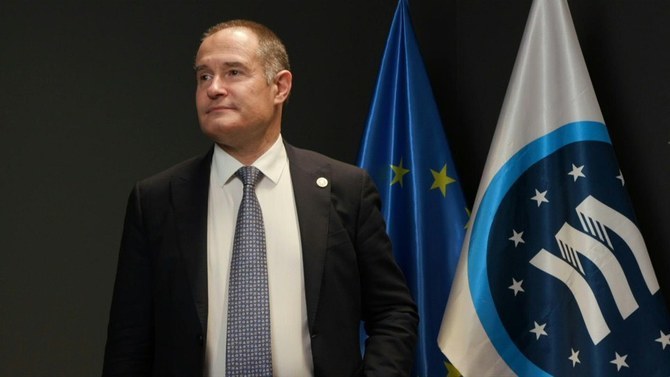PARIS: French officials unwilling to work with a potential far right government should find a new job, the National Rally’s (RN) immigration tsar told Reuters, as he outlined plans to restrict French citizenship, welfare and health care for new arrivals.
Fabrice Leggeri, the former director of the European Union’s border agency Frontex, joined the RN earlier this year in a major coup for the party and went on to launch a successful run for a seat in the European Parliament.
He quit Frontex in 2022 after accusations, which Leggeri has dismissed, that the agency mistreated migrants under his watch.
In an interview on Monday, just days before a two-round legislative election that polls show could catapult the euroskeptic, anti-immigrant RN to power, Leggeri said he was already contacting likeminded public servants he knows from years of working for the French government and the European Union to build a potential RN government. He said others had approached him with offers to help.
Leggeri also fired a warning shot at civil servants unhappy at the thought of working for a far-right government.
“People who aren’t happy need to know that they can leave,” he said, adding those who support “the Trotskyists” and don’t want to work for RN prime ministerial candidate Jordan Bardella can “go back to help the Trotskyists to prepare their program.”
Leggeri echoed policy proposals made by Bardella in a speech on Monday, saying the RN would prioritize a reform to restrict French citizenship rights to make them harder to acquire for those with foreign-born parents, “drastically reduce” immigrant welfare payments, curtail their health care rights and plan a constitutional referendum to toughen immigration laws.
Bardella also said the RN planned to ban dual nationals from certain sensitive jobs in security or defense.
PUSHING FOR CHANGE
Leggeri acknowledged that France has to abide by European law when it comes to immigration policy, leaving it with little room to maneuver. However, he said now is the time to capitalize on a shift to the right in countries such as Italy and the Netherlands to try to change the mindset in Brussels to toughen EU rules.
“We must show with a strong voice in Brussels that France is not alone. There are lots of European countries that want stricter immigration policies,” he said. “The first steps for taking back control are taking advantage of this moment ... to demonstrate force and exercise pressure.”
There are about 7 million immigrants living in France, or about 10.3 percent of the population, with numbers rising steadily since 2000. The RN has long argued that mass immigration is draining France’s coffers and threatening its identity.
Bardella has said immigration costs France 40 billion euros ($42.84 billion) a year, but economists warn that estimate is fanciful as calculating the true costs is almost impossible.
Leggeri, who said he did not expect a ministerial position in an RN government, said he hoped to cut social benefits for immigrants.
“That’s a way we can retake control of our border by reducing the attractiveness for people who are just looking for social aid,” he said.
Additionally, illegal immigrants would only be offered health care in life-threatening situations, he said.
Leggeri said the RN’s plans for a referendum on changes to the constitution to toughen immigration laws would be difficult if Bardella is prime minister while Emmanuel Macron is president, a rare and politically fraught phenomenon known as “cohabitation.”
He said he would like asylum seekers to be forced to apply for refuge at consuls of European Union nations outside the bloc, giving the EU time to build asylum processing centers outside its borders.
“That would allow us to be extremely firm at the physical border when they arrive, and tell them, ‘You won’t receive anything,’” he said.























